Ethics in Social Science
VerifiedAdded on 2023/06/14
|13
|3492
|295
AI Summary
This study explores the key issues of ethics in social science, including individuals’ rights, entitlements, and obligations within a diverse society, the various ethical approaches to practice situations involving potentially conflicting values, and ethical and professional principles influencing decision-making in health and social care. It also discusses the relationship between ethics and professional codes, ethical principles, and critical insights into professional practice. The subject is relevant to courses in social science, health and social care, and ethics, and is applicable to various colleges and universities.
Contribute Materials
Your contribution can guide someone’s learning journey. Share your
documents today.
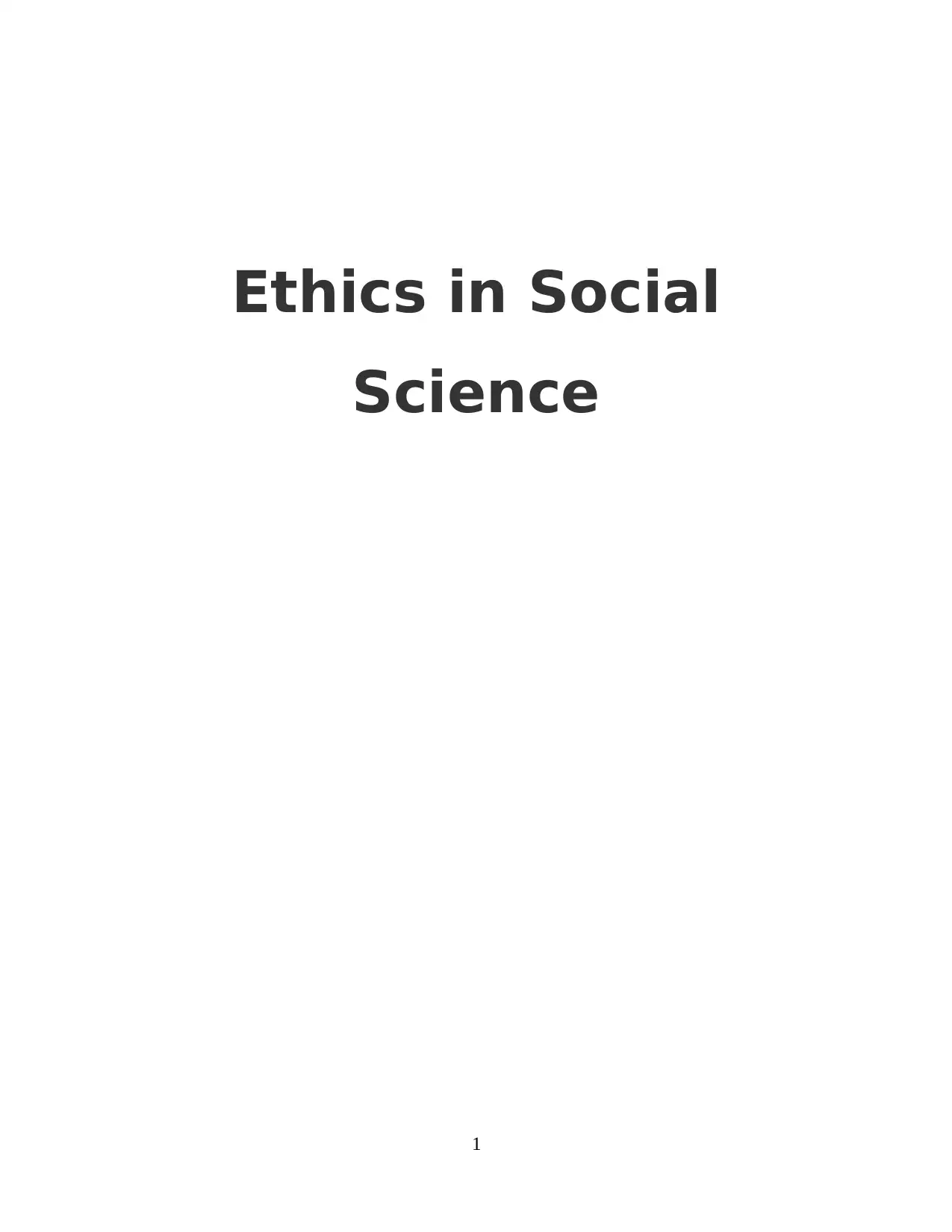
Ethics in Social
Science
1
Science
1
Secure Best Marks with AI Grader
Need help grading? Try our AI Grader for instant feedback on your assignments.
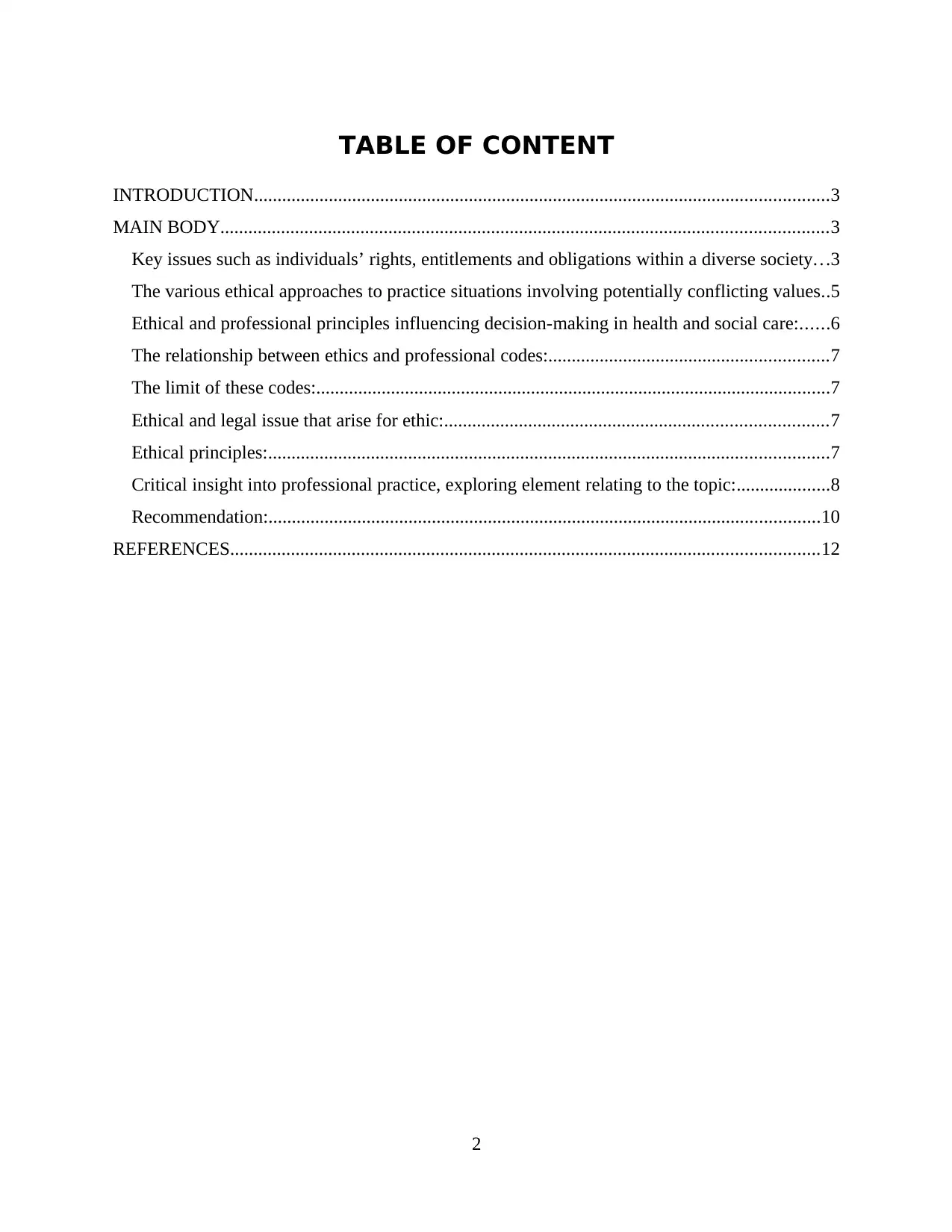
TABLE OF CONTENT
INTRODUCTION...........................................................................................................................3
MAIN BODY..................................................................................................................................3
Key issues such as individuals’ rights, entitlements and obligations within a diverse society...3
The various ethical approaches to practice situations involving potentially conflicting values..5
Ethical and professional principles influencing decision-making in health and social care:......6
The relationship between ethics and professional codes:............................................................7
The limit of these codes:..............................................................................................................7
Ethical and legal issue that arise for ethic:..................................................................................7
Ethical principles:........................................................................................................................7
Critical insight into professional practice, exploring element relating to the topic:....................8
Recommendation:......................................................................................................................10
REFERENCES..............................................................................................................................12
2
INTRODUCTION...........................................................................................................................3
MAIN BODY..................................................................................................................................3
Key issues such as individuals’ rights, entitlements and obligations within a diverse society...3
The various ethical approaches to practice situations involving potentially conflicting values..5
Ethical and professional principles influencing decision-making in health and social care:......6
The relationship between ethics and professional codes:............................................................7
The limit of these codes:..............................................................................................................7
Ethical and legal issue that arise for ethic:..................................................................................7
Ethical principles:........................................................................................................................7
Critical insight into professional practice, exploring element relating to the topic:....................8
Recommendation:......................................................................................................................10
REFERENCES..............................................................................................................................12
2
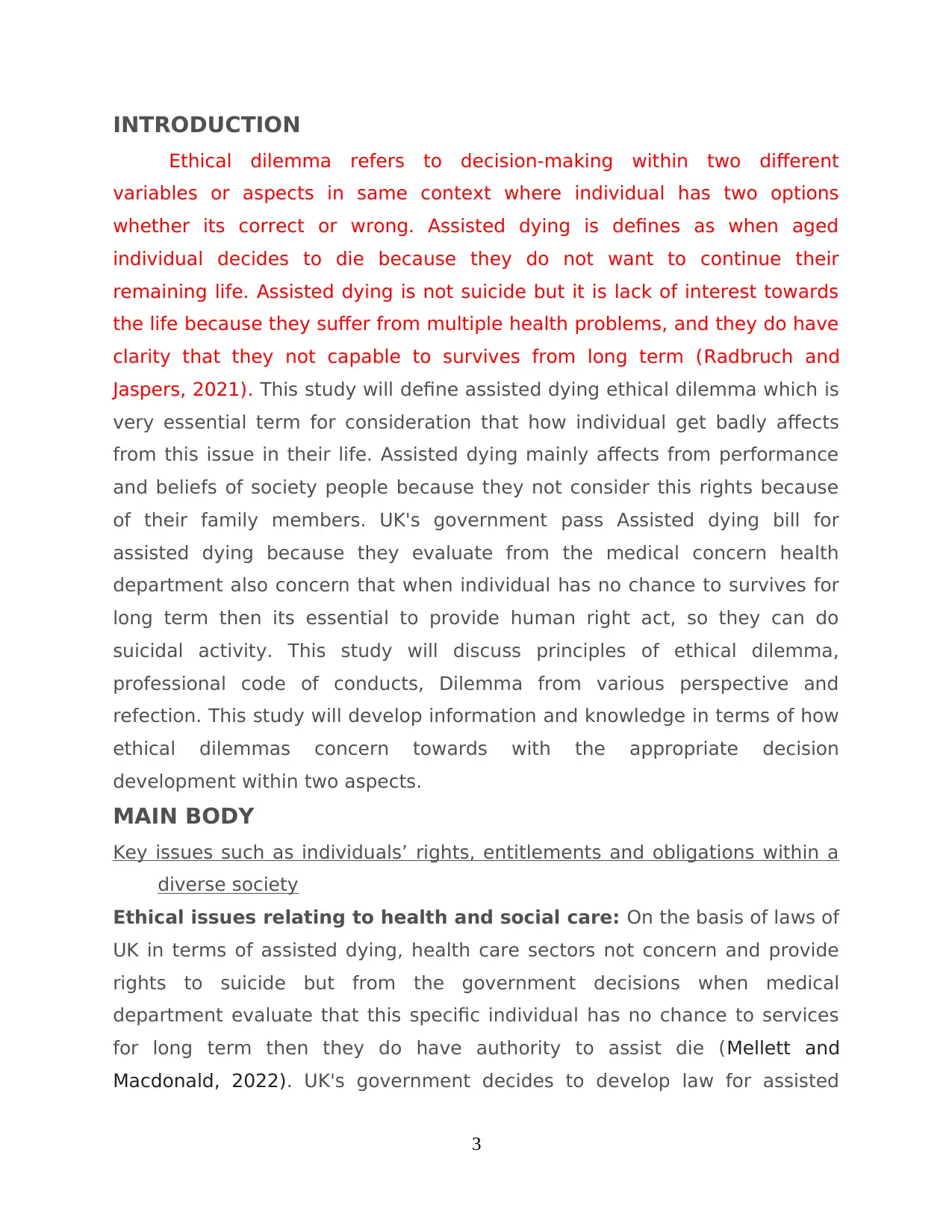
INTRODUCTION
Ethical dilemma refers to decision-making within two different
variables or aspects in same context where individual has two options
whether its correct or wrong. Assisted dying is defines as when aged
individual decides to die because they do not want to continue their
remaining life. Assisted dying is not suicide but it is lack of interest towards
the life because they suffer from multiple health problems, and they do have
clarity that they not capable to survives from long term (Radbruch and
Jaspers, 2021). This study will define assisted dying ethical dilemma which is
very essential term for consideration that how individual get badly affects
from this issue in their life. Assisted dying mainly affects from performance
and beliefs of society people because they not consider this rights because
of their family members. UK's government pass Assisted dying bill for
assisted dying because they evaluate from the medical concern health
department also concern that when individual has no chance to survives for
long term then its essential to provide human right act, so they can do
suicidal activity. This study will discuss principles of ethical dilemma,
professional code of conducts, Dilemma from various perspective and
refection. This study will develop information and knowledge in terms of how
ethical dilemmas concern towards with the appropriate decision
development within two aspects.
MAIN BODY
Key issues such as individuals’ rights, entitlements and obligations within a
diverse society
Ethical issues relating to health and social care: On the basis of laws of
UK in terms of assisted dying, health care sectors not concern and provide
rights to suicide but from the government decisions when medical
department evaluate that this specific individual has no chance to services
for long term then they do have authority to assist die (Mellett and
Macdonald, 2022). UK's government decides to develop law for assisted
3
Ethical dilemma refers to decision-making within two different
variables or aspects in same context where individual has two options
whether its correct or wrong. Assisted dying is defines as when aged
individual decides to die because they do not want to continue their
remaining life. Assisted dying is not suicide but it is lack of interest towards
the life because they suffer from multiple health problems, and they do have
clarity that they not capable to survives from long term (Radbruch and
Jaspers, 2021). This study will define assisted dying ethical dilemma which is
very essential term for consideration that how individual get badly affects
from this issue in their life. Assisted dying mainly affects from performance
and beliefs of society people because they not consider this rights because
of their family members. UK's government pass Assisted dying bill for
assisted dying because they evaluate from the medical concern health
department also concern that when individual has no chance to survives for
long term then its essential to provide human right act, so they can do
suicidal activity. This study will discuss principles of ethical dilemma,
professional code of conducts, Dilemma from various perspective and
refection. This study will develop information and knowledge in terms of how
ethical dilemmas concern towards with the appropriate decision
development within two aspects.
MAIN BODY
Key issues such as individuals’ rights, entitlements and obligations within a
diverse society
Ethical issues relating to health and social care: On the basis of laws of
UK in terms of assisted dying, health care sectors not concern and provide
rights to suicide but from the government decisions when medical
department evaluate that this specific individual has no chance to services
for long term then they do have authority to assist die (Mellett and
Macdonald, 2022). UK's government decides to develop law for assisted
3
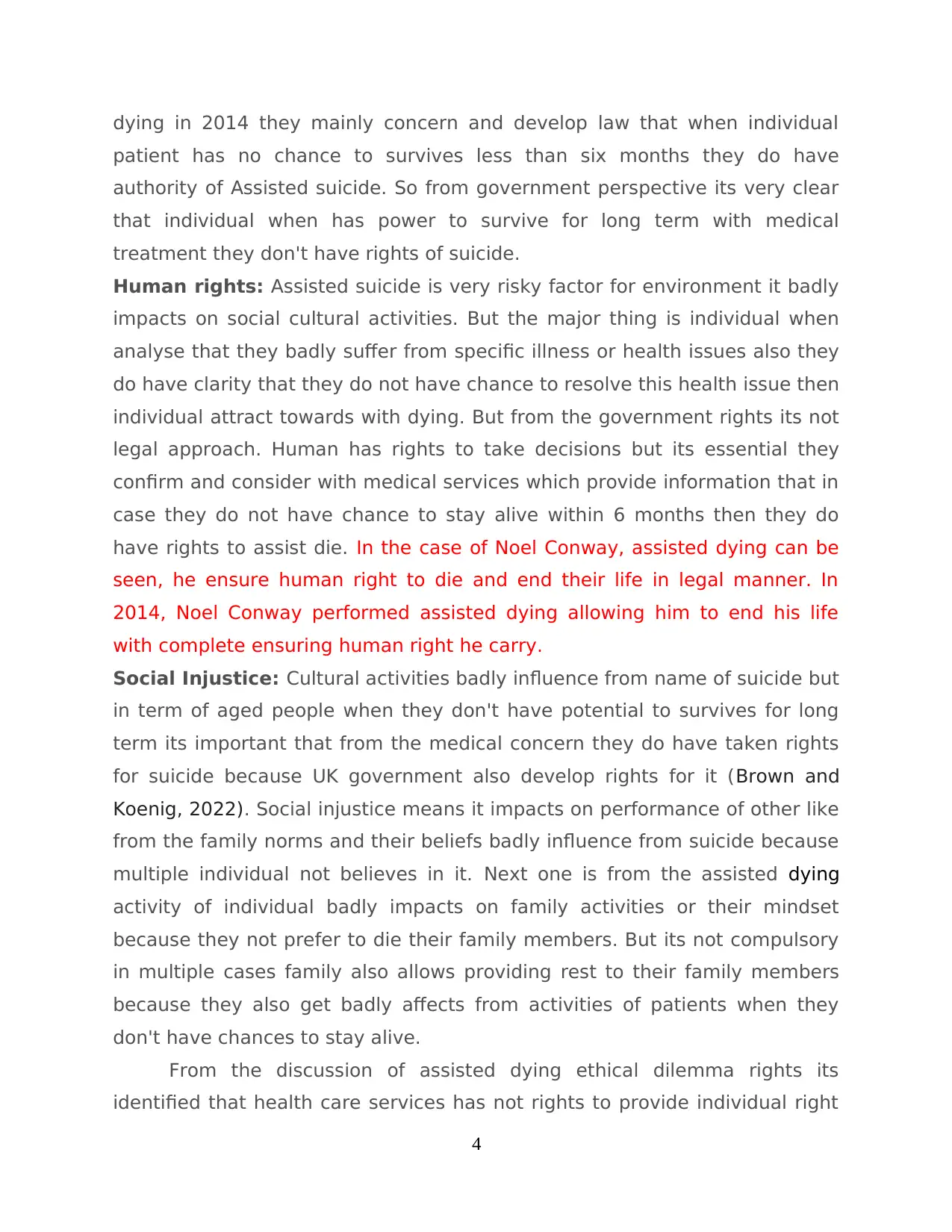
dying in 2014 they mainly concern and develop law that when individual
patient has no chance to survives less than six months they do have
authority of Assisted suicide. So from government perspective its very clear
that individual when has power to survive for long term with medical
treatment they don't have rights of suicide.
Human rights: Assisted suicide is very risky factor for environment it badly
impacts on social cultural activities. But the major thing is individual when
analyse that they badly suffer from specific illness or health issues also they
do have clarity that they do not have chance to resolve this health issue then
individual attract towards with dying. But from the government rights its not
legal approach. Human has rights to take decisions but its essential they
confirm and consider with medical services which provide information that in
case they do not have chance to stay alive within 6 months then they do
have rights to assist die. In the case of Noel Conway, assisted dying can be
seen, he ensure human right to die and end their life in legal manner. In
2014, Noel Conway performed assisted dying allowing him to end his life
with complete ensuring human right he carry.
Social Injustice: Cultural activities badly influence from name of suicide but
in term of aged people when they don't have potential to survives for long
term its important that from the medical concern they do have taken rights
for suicide because UK government also develop rights for it (Brown and
Koenig, 2022). Social injustice means it impacts on performance of other like
from the family norms and their beliefs badly influence from suicide because
multiple individual not believes in it. Next one is from the assisted dying
activity of individual badly impacts on family activities or their mindset
because they not prefer to die their family members. But its not compulsory
in multiple cases family also allows providing rest to their family members
because they also get badly affects from activities of patients when they
don't have chances to stay alive.
From the discussion of assisted dying ethical dilemma rights its
identified that health care services has not rights to provide individual right
4
patient has no chance to survives less than six months they do have
authority of Assisted suicide. So from government perspective its very clear
that individual when has power to survive for long term with medical
treatment they don't have rights of suicide.
Human rights: Assisted suicide is very risky factor for environment it badly
impacts on social cultural activities. But the major thing is individual when
analyse that they badly suffer from specific illness or health issues also they
do have clarity that they do not have chance to resolve this health issue then
individual attract towards with dying. But from the government rights its not
legal approach. Human has rights to take decisions but its essential they
confirm and consider with medical services which provide information that in
case they do not have chance to stay alive within 6 months then they do
have rights to assist die. In the case of Noel Conway, assisted dying can be
seen, he ensure human right to die and end their life in legal manner. In
2014, Noel Conway performed assisted dying allowing him to end his life
with complete ensuring human right he carry.
Social Injustice: Cultural activities badly influence from name of suicide but
in term of aged people when they don't have potential to survives for long
term its important that from the medical concern they do have taken rights
for suicide because UK government also develop rights for it (Brown and
Koenig, 2022). Social injustice means it impacts on performance of other like
from the family norms and their beliefs badly influence from suicide because
multiple individual not believes in it. Next one is from the assisted dying
activity of individual badly impacts on family activities or their mindset
because they not prefer to die their family members. But its not compulsory
in multiple cases family also allows providing rest to their family members
because they also get badly affects from activities of patients when they
don't have chances to stay alive.
From the discussion of assisted dying ethical dilemma rights its
identified that health care services has not rights to provide individual right
4
Secure Best Marks with AI Grader
Need help grading? Try our AI Grader for instant feedback on your assignments.
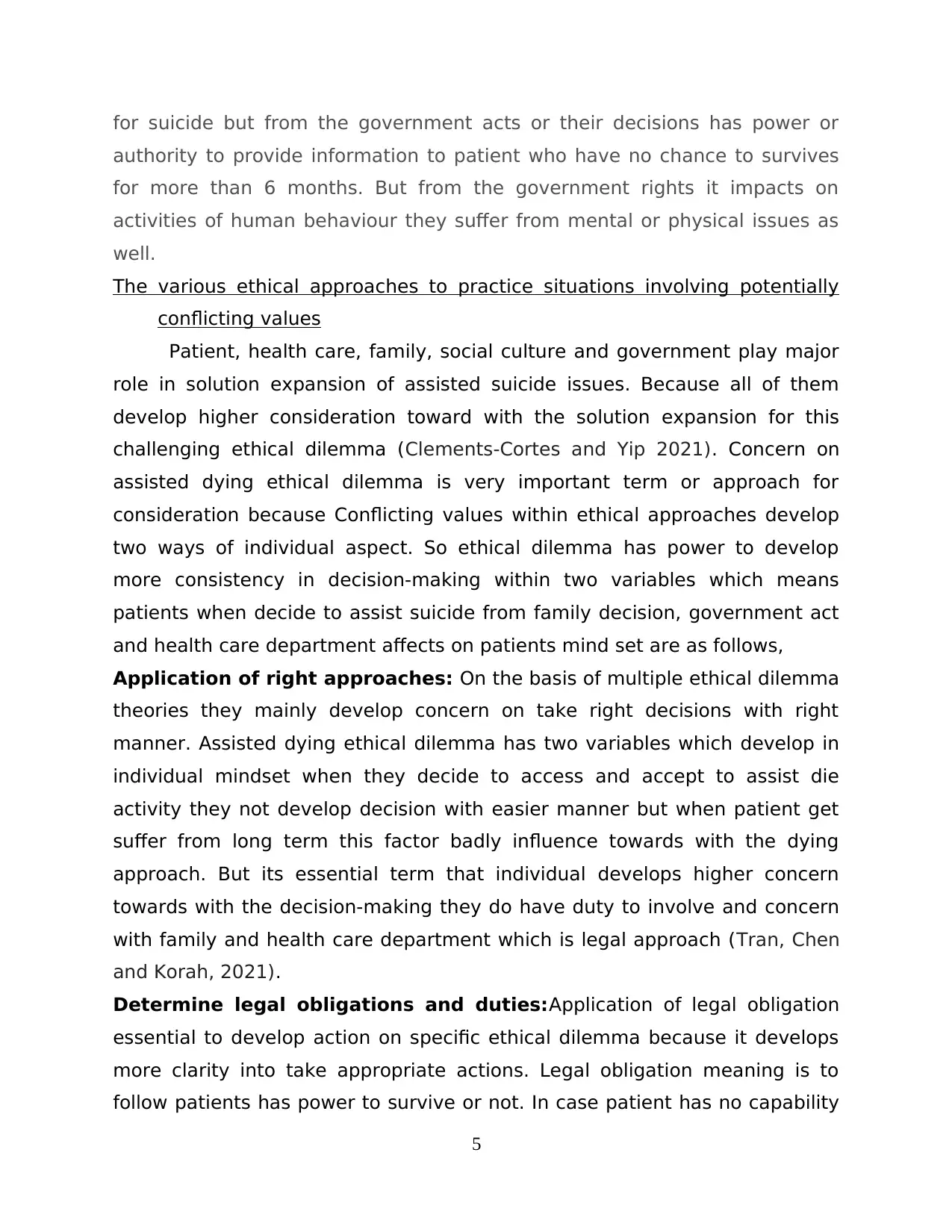
for suicide but from the government acts or their decisions has power or
authority to provide information to patient who have no chance to survives
for more than 6 months. But from the government rights it impacts on
activities of human behaviour they suffer from mental or physical issues as
well.
The various ethical approaches to practice situations involving potentially
conflicting values
Patient, health care, family, social culture and government play major
role in solution expansion of assisted suicide issues. Because all of them
develop higher consideration toward with the solution expansion for this
challenging ethical dilemma (Clements-Cortes and Yip 2021). Concern on
assisted dying ethical dilemma is very important term or approach for
consideration because Conflicting values within ethical approaches develop
two ways of individual aspect. So ethical dilemma has power to develop
more consistency in decision-making within two variables which means
patients when decide to assist suicide from family decision, government act
and health care department affects on patients mind set are as follows,
Application of right approaches: On the basis of multiple ethical dilemma
theories they mainly develop concern on take right decisions with right
manner. Assisted dying ethical dilemma has two variables which develop in
individual mindset when they decide to access and accept to assist die
activity they not develop decision with easier manner but when patient get
suffer from long term this factor badly influence towards with the dying
approach. But its essential term that individual develops higher concern
towards with the decision-making they do have duty to involve and concern
with family and health care department which is legal approach (Tran, Chen
and Korah, 2021).
Determine legal obligations and duties:Application of legal obligation
essential to develop action on specific ethical dilemma because it develops
more clarity into take appropriate actions. Legal obligation meaning is to
follow patients has power to survive or not. In case patient has no capability
5
authority to provide information to patient who have no chance to survives
for more than 6 months. But from the government rights it impacts on
activities of human behaviour they suffer from mental or physical issues as
well.
The various ethical approaches to practice situations involving potentially
conflicting values
Patient, health care, family, social culture and government play major
role in solution expansion of assisted suicide issues. Because all of them
develop higher consideration toward with the solution expansion for this
challenging ethical dilemma (Clements-Cortes and Yip 2021). Concern on
assisted dying ethical dilemma is very important term or approach for
consideration because Conflicting values within ethical approaches develop
two ways of individual aspect. So ethical dilemma has power to develop
more consistency in decision-making within two variables which means
patients when decide to assist suicide from family decision, government act
and health care department affects on patients mind set are as follows,
Application of right approaches: On the basis of multiple ethical dilemma
theories they mainly develop concern on take right decisions with right
manner. Assisted dying ethical dilemma has two variables which develop in
individual mindset when they decide to access and accept to assist die
activity they not develop decision with easier manner but when patient get
suffer from long term this factor badly influence towards with the dying
approach. But its essential term that individual develops higher concern
towards with the decision-making they do have duty to involve and concern
with family and health care department which is legal approach (Tran, Chen
and Korah, 2021).
Determine legal obligations and duties:Application of legal obligation
essential to develop action on specific ethical dilemma because it develops
more clarity into take appropriate actions. Legal obligation meaning is to
follow patients has power to survive or not. In case patient has no capability
5
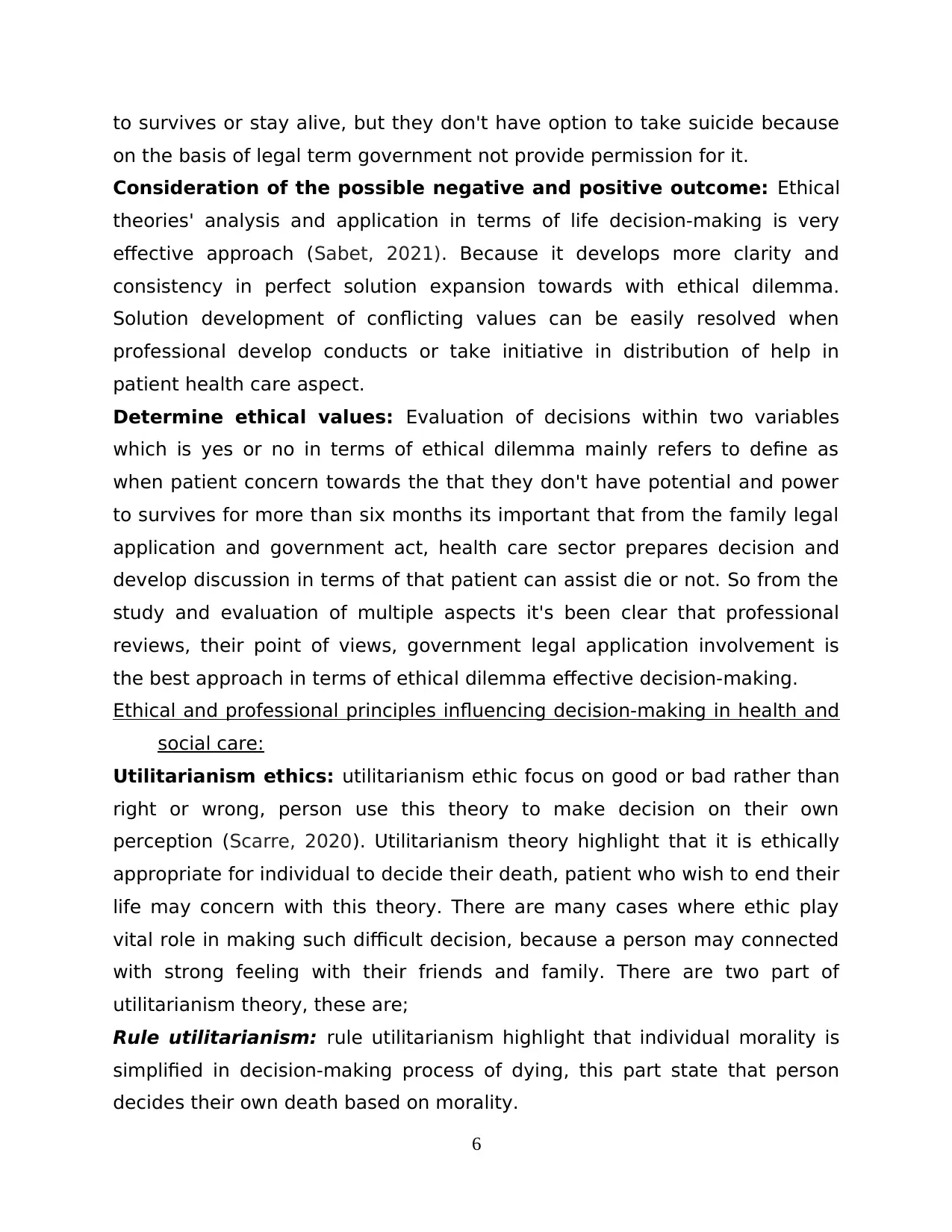
to survives or stay alive, but they don't have option to take suicide because
on the basis of legal term government not provide permission for it.
Consideration of the possible negative and positive outcome: Ethical
theories' analysis and application in terms of life decision-making is very
effective approach (Sabet, 2021). Because it develops more clarity and
consistency in perfect solution expansion towards with ethical dilemma.
Solution development of conflicting values can be easily resolved when
professional develop conducts or take initiative in distribution of help in
patient health care aspect.
Determine ethical values: Evaluation of decisions within two variables
which is yes or no in terms of ethical dilemma mainly refers to define as
when patient concern towards the that they don't have potential and power
to survives for more than six months its important that from the family legal
application and government act, health care sector prepares decision and
develop discussion in terms of that patient can assist die or not. So from the
study and evaluation of multiple aspects it's been clear that professional
reviews, their point of views, government legal application involvement is
the best approach in terms of ethical dilemma effective decision-making.
Ethical and professional principles influencing decision-making in health and
social care:
Utilitarianism ethics: utilitarianism ethic focus on good or bad rather than
right or wrong, person use this theory to make decision on their own
perception (Scarre, 2020). Utilitarianism theory highlight that it is ethically
appropriate for individual to decide their death, patient who wish to end their
life may concern with this theory. There are many cases where ethic play
vital role in making such difficult decision, because a person may connected
with strong feeling with their friends and family. There are two part of
utilitarianism theory, these are;
Rule utilitarianism: rule utilitarianism highlight that individual morality is
simplified in decision-making process of dying, this part state that person
decides their own death based on morality.
6
on the basis of legal term government not provide permission for it.
Consideration of the possible negative and positive outcome: Ethical
theories' analysis and application in terms of life decision-making is very
effective approach (Sabet, 2021). Because it develops more clarity and
consistency in perfect solution expansion towards with ethical dilemma.
Solution development of conflicting values can be easily resolved when
professional develop conducts or take initiative in distribution of help in
patient health care aspect.
Determine ethical values: Evaluation of decisions within two variables
which is yes or no in terms of ethical dilemma mainly refers to define as
when patient concern towards the that they don't have potential and power
to survives for more than six months its important that from the family legal
application and government act, health care sector prepares decision and
develop discussion in terms of that patient can assist die or not. So from the
study and evaluation of multiple aspects it's been clear that professional
reviews, their point of views, government legal application involvement is
the best approach in terms of ethical dilemma effective decision-making.
Ethical and professional principles influencing decision-making in health and
social care:
Utilitarianism ethics: utilitarianism ethic focus on good or bad rather than
right or wrong, person use this theory to make decision on their own
perception (Scarre, 2020). Utilitarianism theory highlight that it is ethically
appropriate for individual to decide their death, patient who wish to end their
life may concern with this theory. There are many cases where ethic play
vital role in making such difficult decision, because a person may connected
with strong feeling with their friends and family. There are two part of
utilitarianism theory, these are;
Rule utilitarianism: rule utilitarianism highlight that individual morality is
simplified in decision-making process of dying, this part state that person
decides their own death based on morality.
6
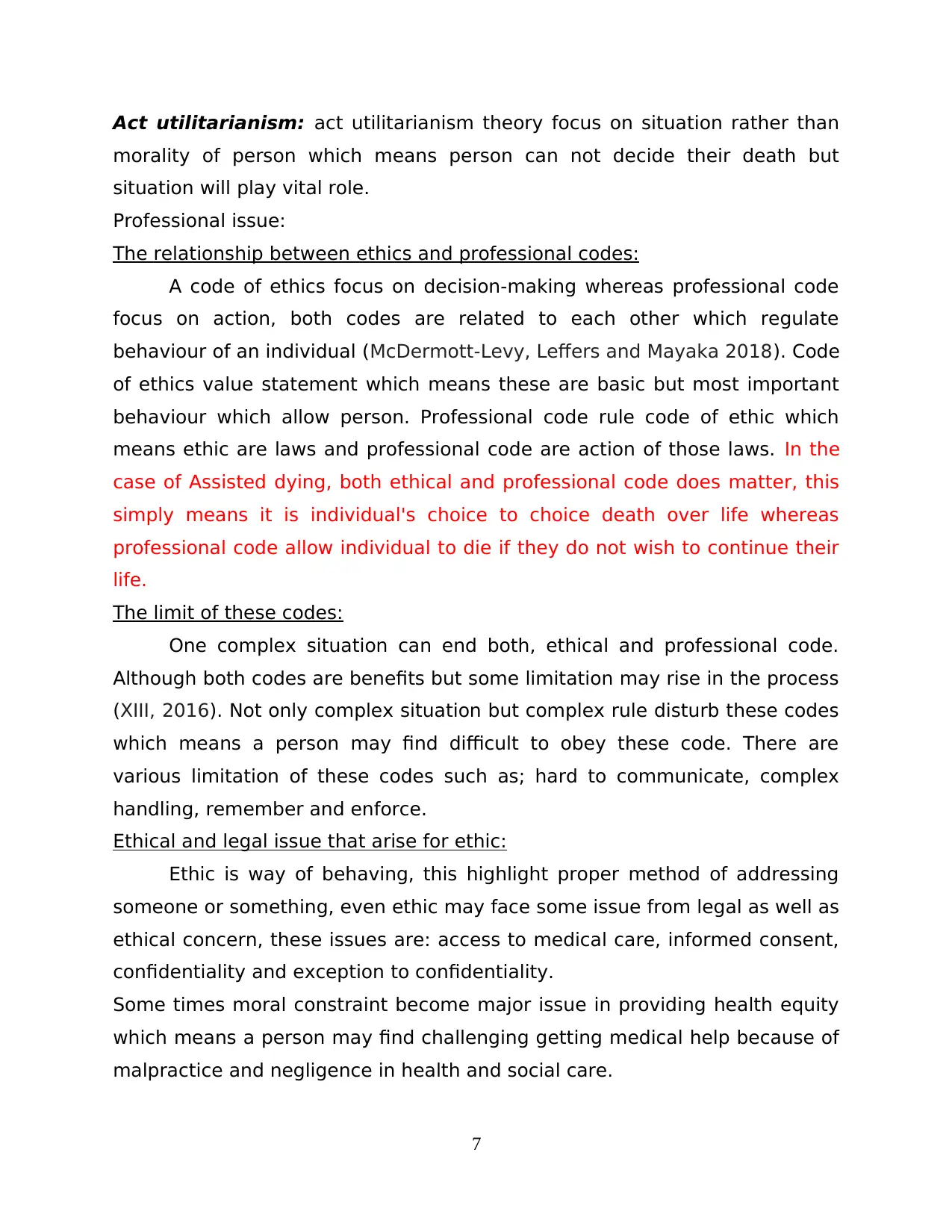
Act utilitarianism: act utilitarianism theory focus on situation rather than
morality of person which means person can not decide their death but
situation will play vital role.
Professional issue:
The relationship between ethics and professional codes:
A code of ethics focus on decision-making whereas professional code
focus on action, both codes are related to each other which regulate
behaviour of an individual (McDermott-Levy, Leffers and Mayaka 2018). Code
of ethics value statement which means these are basic but most important
behaviour which allow person. Professional code rule code of ethic which
means ethic are laws and professional code are action of those laws. In the
case of Assisted dying, both ethical and professional code does matter, this
simply means it is individual's choice to choice death over life whereas
professional code allow individual to die if they do not wish to continue their
life.
The limit of these codes:
One complex situation can end both, ethical and professional code.
Although both codes are benefits but some limitation may rise in the process
(XIII, 2016). Not only complex situation but complex rule disturb these codes
which means a person may find difficult to obey these code. There are
various limitation of these codes such as; hard to communicate, complex
handling, remember and enforce.
Ethical and legal issue that arise for ethic:
Ethic is way of behaving, this highlight proper method of addressing
someone or something, even ethic may face some issue from legal as well as
ethical concern, these issues are: access to medical care, informed consent,
confidentiality and exception to confidentiality.
Some times moral constraint become major issue in providing health equity
which means a person may find challenging getting medical help because of
malpractice and negligence in health and social care.
7
morality of person which means person can not decide their death but
situation will play vital role.
Professional issue:
The relationship between ethics and professional codes:
A code of ethics focus on decision-making whereas professional code
focus on action, both codes are related to each other which regulate
behaviour of an individual (McDermott-Levy, Leffers and Mayaka 2018). Code
of ethics value statement which means these are basic but most important
behaviour which allow person. Professional code rule code of ethic which
means ethic are laws and professional code are action of those laws. In the
case of Assisted dying, both ethical and professional code does matter, this
simply means it is individual's choice to choice death over life whereas
professional code allow individual to die if they do not wish to continue their
life.
The limit of these codes:
One complex situation can end both, ethical and professional code.
Although both codes are benefits but some limitation may rise in the process
(XIII, 2016). Not only complex situation but complex rule disturb these codes
which means a person may find difficult to obey these code. There are
various limitation of these codes such as; hard to communicate, complex
handling, remember and enforce.
Ethical and legal issue that arise for ethic:
Ethic is way of behaving, this highlight proper method of addressing
someone or something, even ethic may face some issue from legal as well as
ethical concern, these issues are: access to medical care, informed consent,
confidentiality and exception to confidentiality.
Some times moral constraint become major issue in providing health equity
which means a person may find challenging getting medical help because of
malpractice and negligence in health and social care.
7
Paraphrase This Document
Need a fresh take? Get an instant paraphrase of this document with our AI Paraphraser
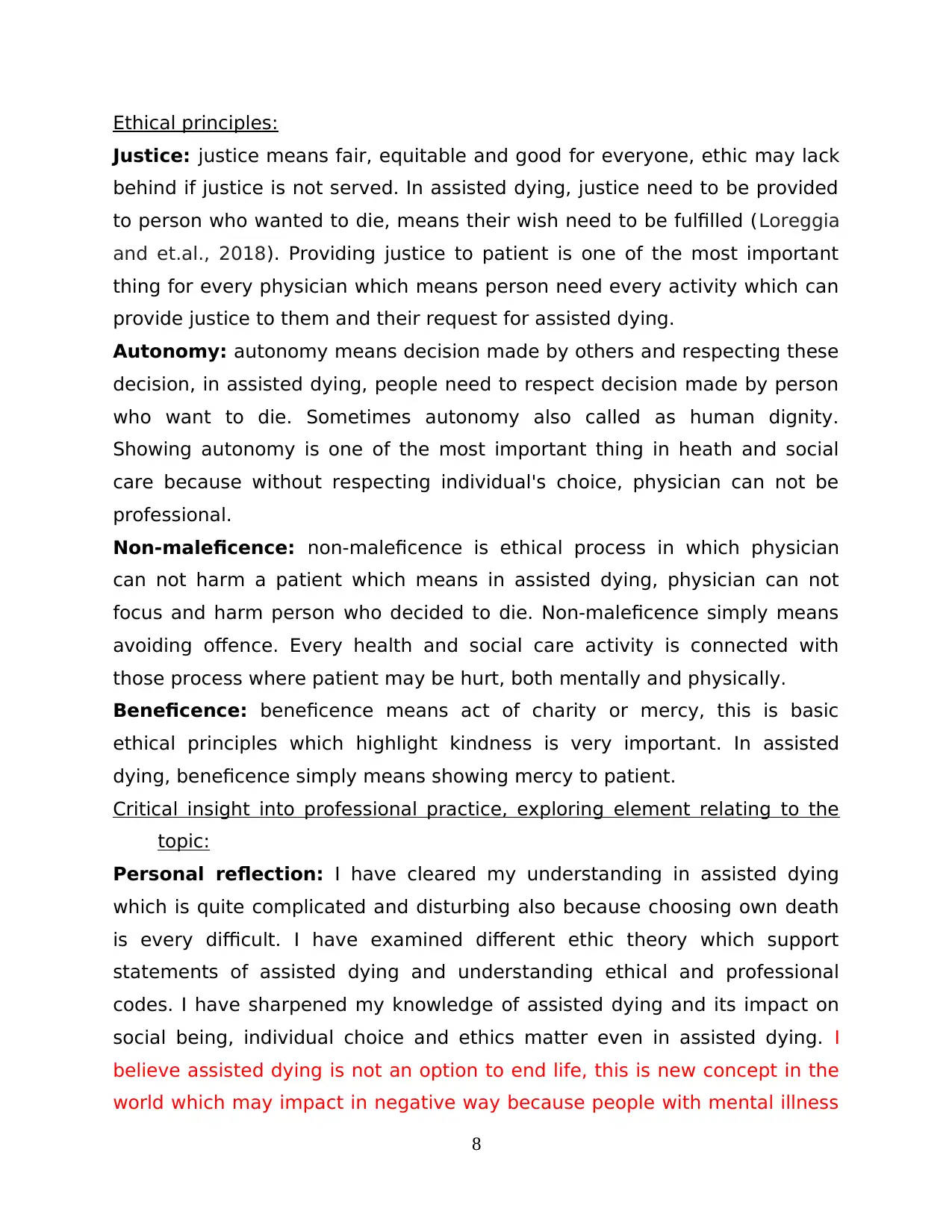
Ethical principles:
Justice: justice means fair, equitable and good for everyone, ethic may lack
behind if justice is not served. In assisted dying, justice need to be provided
to person who wanted to die, means their wish need to be fulfilled (Loreggia
and et.al., 2018). Providing justice to patient is one of the most important
thing for every physician which means person need every activity which can
provide justice to them and their request for assisted dying.
Autonomy: autonomy means decision made by others and respecting these
decision, in assisted dying, people need to respect decision made by person
who want to die. Sometimes autonomy also called as human dignity.
Showing autonomy is one of the most important thing in heath and social
care because without respecting individual's choice, physician can not be
professional.
Non-maleficence: non-maleficence is ethical process in which physician
can not harm a patient which means in assisted dying, physician can not
focus and harm person who decided to die. Non-maleficence simply means
avoiding offence. Every health and social care activity is connected with
those process where patient may be hurt, both mentally and physically.
Beneficence: beneficence means act of charity or mercy, this is basic
ethical principles which highlight kindness is very important. In assisted
dying, beneficence simply means showing mercy to patient.
Critical insight into professional practice, exploring element relating to the
topic:
Personal reflection: I have cleared my understanding in assisted dying
which is quite complicated and disturbing also because choosing own death
is every difficult. I have examined different ethic theory which support
statements of assisted dying and understanding ethical and professional
codes. I have sharpened my knowledge of assisted dying and its impact on
social being, individual choice and ethics matter even in assisted dying. I
believe assisted dying is not an option to end life, this is new concept in the
world which may impact in negative way because people with mental illness
8
Justice: justice means fair, equitable and good for everyone, ethic may lack
behind if justice is not served. In assisted dying, justice need to be provided
to person who wanted to die, means their wish need to be fulfilled (Loreggia
and et.al., 2018). Providing justice to patient is one of the most important
thing for every physician which means person need every activity which can
provide justice to them and their request for assisted dying.
Autonomy: autonomy means decision made by others and respecting these
decision, in assisted dying, people need to respect decision made by person
who want to die. Sometimes autonomy also called as human dignity.
Showing autonomy is one of the most important thing in heath and social
care because without respecting individual's choice, physician can not be
professional.
Non-maleficence: non-maleficence is ethical process in which physician
can not harm a patient which means in assisted dying, physician can not
focus and harm person who decided to die. Non-maleficence simply means
avoiding offence. Every health and social care activity is connected with
those process where patient may be hurt, both mentally and physically.
Beneficence: beneficence means act of charity or mercy, this is basic
ethical principles which highlight kindness is very important. In assisted
dying, beneficence simply means showing mercy to patient.
Critical insight into professional practice, exploring element relating to the
topic:
Personal reflection: I have cleared my understanding in assisted dying
which is quite complicated and disturbing also because choosing own death
is every difficult. I have examined different ethic theory which support
statements of assisted dying and understanding ethical and professional
codes. I have sharpened my knowledge of assisted dying and its impact on
social being, individual choice and ethics matter even in assisted dying. I
believe assisted dying is not an option to end life, this is new concept in the
world which may impact in negative way because people with mental illness
8
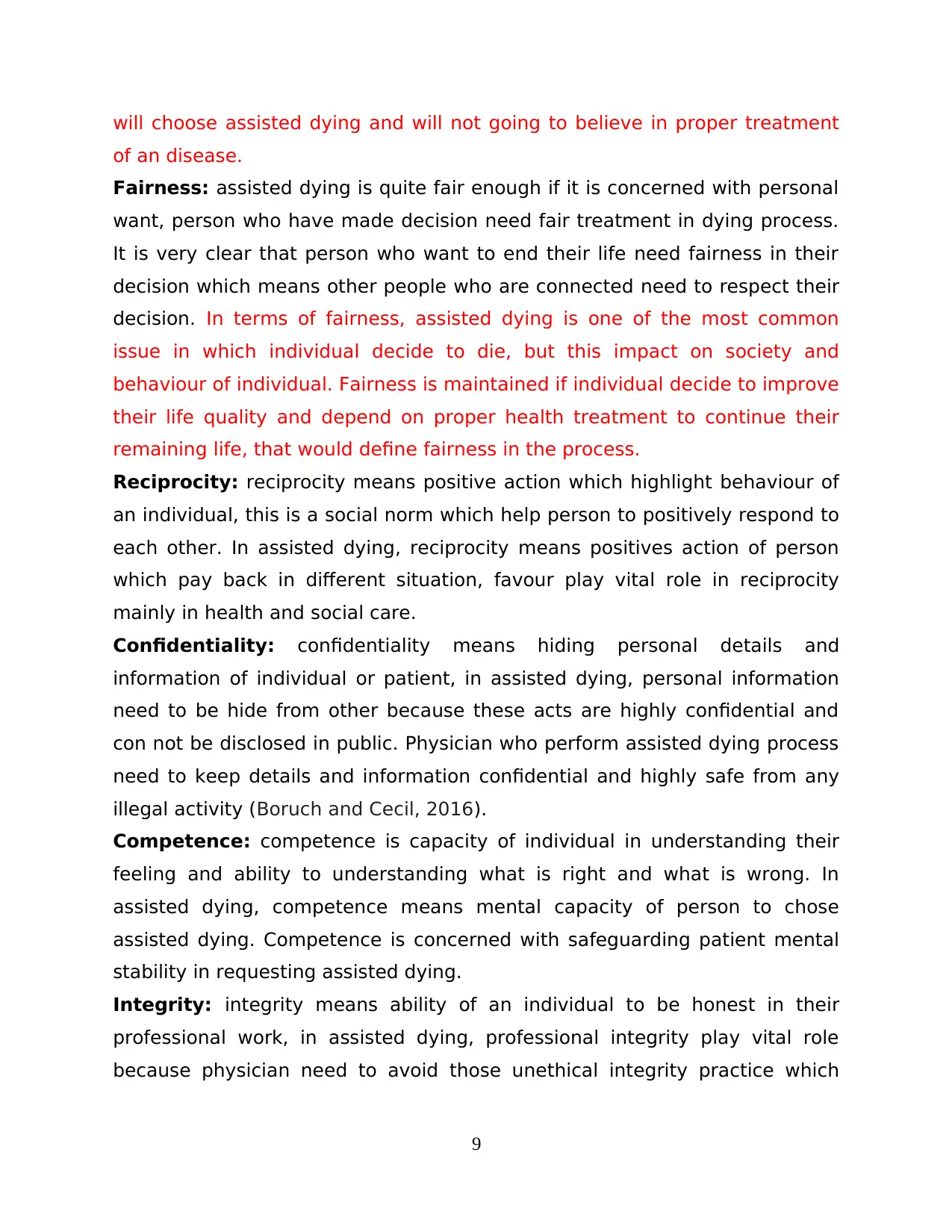
will choose assisted dying and will not going to believe in proper treatment
of an disease.
Fairness: assisted dying is quite fair enough if it is concerned with personal
want, person who have made decision need fair treatment in dying process.
It is very clear that person who want to end their life need fairness in their
decision which means other people who are connected need to respect their
decision. In terms of fairness, assisted dying is one of the most common
issue in which individual decide to die, but this impact on society and
behaviour of individual. Fairness is maintained if individual decide to improve
their life quality and depend on proper health treatment to continue their
remaining life, that would define fairness in the process.
Reciprocity: reciprocity means positive action which highlight behaviour of
an individual, this is a social norm which help person to positively respond to
each other. In assisted dying, reciprocity means positives action of person
which pay back in different situation, favour play vital role in reciprocity
mainly in health and social care.
Confidentiality: confidentiality means hiding personal details and
information of individual or patient, in assisted dying, personal information
need to be hide from other because these acts are highly confidential and
con not be disclosed in public. Physician who perform assisted dying process
need to keep details and information confidential and highly safe from any
illegal activity (Boruch and Cecil, 2016).
Competence: competence is capacity of individual in understanding their
feeling and ability to understanding what is right and what is wrong. In
assisted dying, competence means mental capacity of person to chose
assisted dying. Competence is concerned with safeguarding patient mental
stability in requesting assisted dying.
Integrity: integrity means ability of an individual to be honest in their
professional work, in assisted dying, professional integrity play vital role
because physician need to avoid those unethical integrity practice which
9
of an disease.
Fairness: assisted dying is quite fair enough if it is concerned with personal
want, person who have made decision need fair treatment in dying process.
It is very clear that person who want to end their life need fairness in their
decision which means other people who are connected need to respect their
decision. In terms of fairness, assisted dying is one of the most common
issue in which individual decide to die, but this impact on society and
behaviour of individual. Fairness is maintained if individual decide to improve
their life quality and depend on proper health treatment to continue their
remaining life, that would define fairness in the process.
Reciprocity: reciprocity means positive action which highlight behaviour of
an individual, this is a social norm which help person to positively respond to
each other. In assisted dying, reciprocity means positives action of person
which pay back in different situation, favour play vital role in reciprocity
mainly in health and social care.
Confidentiality: confidentiality means hiding personal details and
information of individual or patient, in assisted dying, personal information
need to be hide from other because these acts are highly confidential and
con not be disclosed in public. Physician who perform assisted dying process
need to keep details and information confidential and highly safe from any
illegal activity (Boruch and Cecil, 2016).
Competence: competence is capacity of individual in understanding their
feeling and ability to understanding what is right and what is wrong. In
assisted dying, competence means mental capacity of person to chose
assisted dying. Competence is concerned with safeguarding patient mental
stability in requesting assisted dying.
Integrity: integrity means ability of an individual to be honest in their
professional work, in assisted dying, professional integrity play vital role
because physician need to avoid those unethical integrity practice which
9
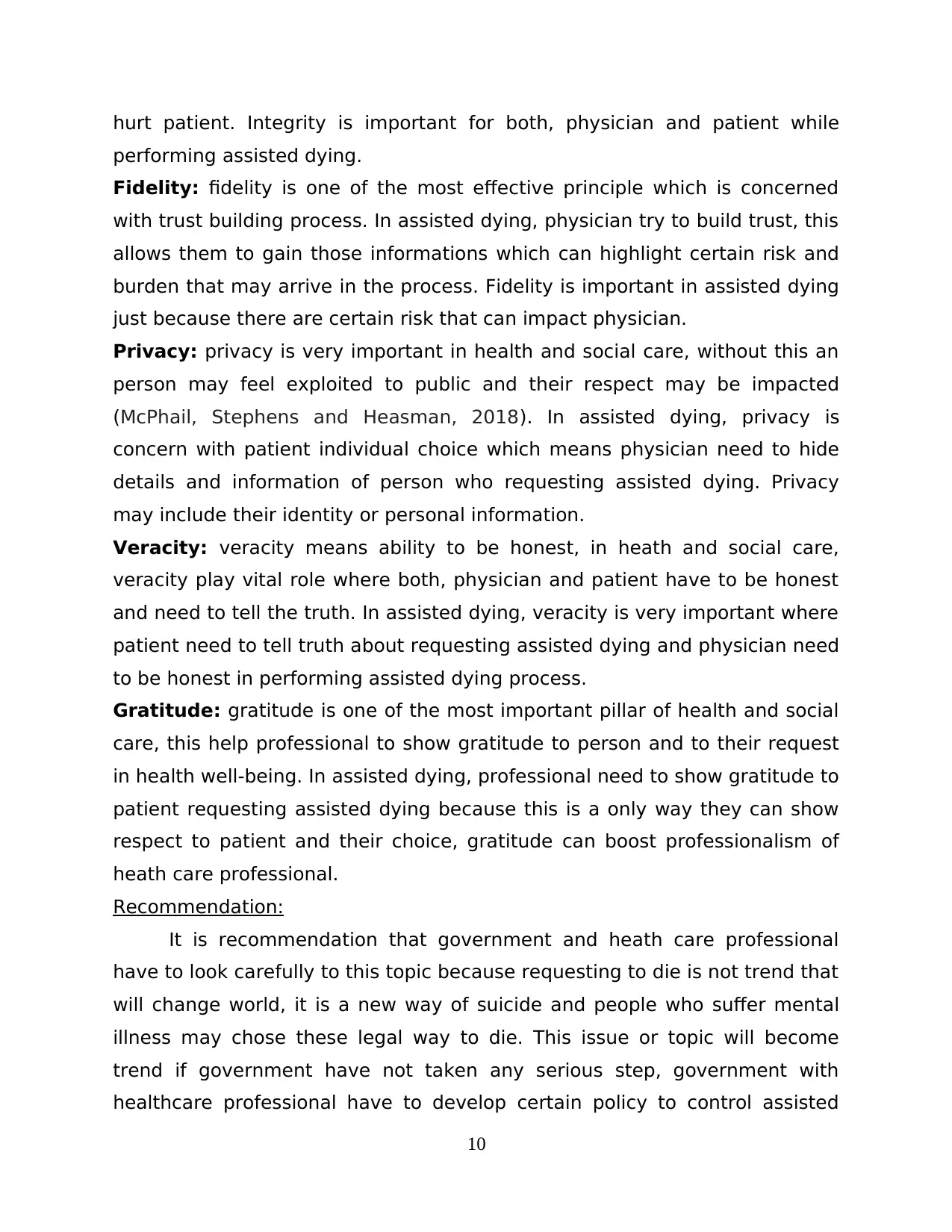
hurt patient. Integrity is important for both, physician and patient while
performing assisted dying.
Fidelity: fidelity is one of the most effective principle which is concerned
with trust building process. In assisted dying, physician try to build trust, this
allows them to gain those informations which can highlight certain risk and
burden that may arrive in the process. Fidelity is important in assisted dying
just because there are certain risk that can impact physician.
Privacy: privacy is very important in health and social care, without this an
person may feel exploited to public and their respect may be impacted
(McPhail, Stephens and Heasman, 2018). In assisted dying, privacy is
concern with patient individual choice which means physician need to hide
details and information of person who requesting assisted dying. Privacy
may include their identity or personal information.
Veracity: veracity means ability to be honest, in heath and social care,
veracity play vital role where both, physician and patient have to be honest
and need to tell the truth. In assisted dying, veracity is very important where
patient need to tell truth about requesting assisted dying and physician need
to be honest in performing assisted dying process.
Gratitude: gratitude is one of the most important pillar of health and social
care, this help professional to show gratitude to person and to their request
in health well-being. In assisted dying, professional need to show gratitude to
patient requesting assisted dying because this is a only way they can show
respect to patient and their choice, gratitude can boost professionalism of
heath care professional.
Recommendation:
It is recommendation that government and heath care professional
have to look carefully to this topic because requesting to die is not trend that
will change world, it is a new way of suicide and people who suffer mental
illness may chose these legal way to die. This issue or topic will become
trend if government have not taken any serious step, government with
healthcare professional have to develop certain policy to control assisted
10
performing assisted dying.
Fidelity: fidelity is one of the most effective principle which is concerned
with trust building process. In assisted dying, physician try to build trust, this
allows them to gain those informations which can highlight certain risk and
burden that may arrive in the process. Fidelity is important in assisted dying
just because there are certain risk that can impact physician.
Privacy: privacy is very important in health and social care, without this an
person may feel exploited to public and their respect may be impacted
(McPhail, Stephens and Heasman, 2018). In assisted dying, privacy is
concern with patient individual choice which means physician need to hide
details and information of person who requesting assisted dying. Privacy
may include their identity or personal information.
Veracity: veracity means ability to be honest, in heath and social care,
veracity play vital role where both, physician and patient have to be honest
and need to tell the truth. In assisted dying, veracity is very important where
patient need to tell truth about requesting assisted dying and physician need
to be honest in performing assisted dying process.
Gratitude: gratitude is one of the most important pillar of health and social
care, this help professional to show gratitude to person and to their request
in health well-being. In assisted dying, professional need to show gratitude to
patient requesting assisted dying because this is a only way they can show
respect to patient and their choice, gratitude can boost professionalism of
heath care professional.
Recommendation:
It is recommendation that government and heath care professional
have to look carefully to this topic because requesting to die is not trend that
will change world, it is a new way of suicide and people who suffer mental
illness may chose these legal way to die. This issue or topic will become
trend if government have not taken any serious step, government with
healthcare professional have to develop certain policy to control assisted
10
Secure Best Marks with AI Grader
Need help grading? Try our AI Grader for instant feedback on your assignments.
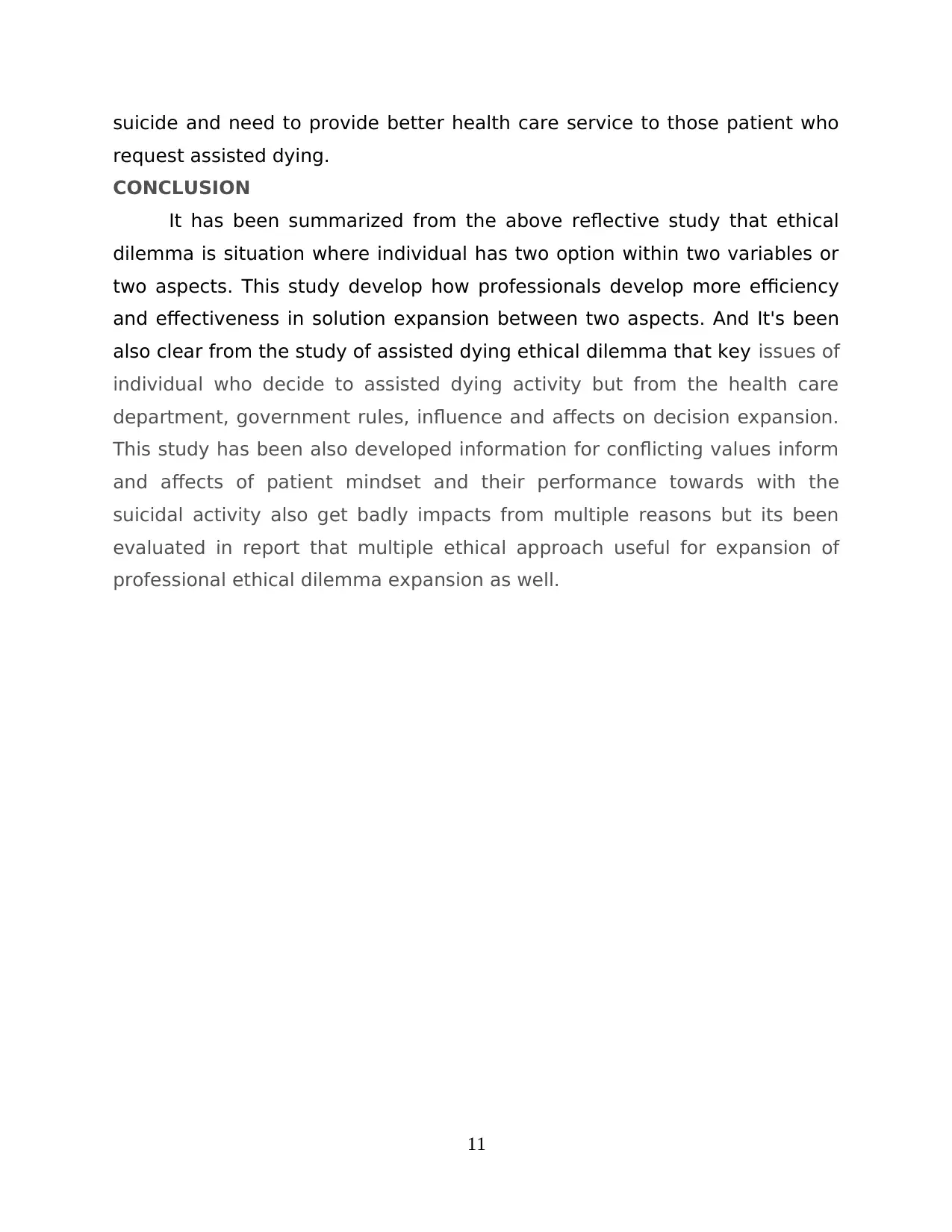
suicide and need to provide better health care service to those patient who
request assisted dying.
CONCLUSION
It has been summarized from the above reflective study that ethical
dilemma is situation where individual has two option within two variables or
two aspects. This study develop how professionals develop more efficiency
and effectiveness in solution expansion between two aspects. And It's been
also clear from the study of assisted dying ethical dilemma that key issues of
individual who decide to assisted dying activity but from the health care
department, government rules, influence and affects on decision expansion.
This study has been also developed information for conflicting values inform
and affects of patient mindset and their performance towards with the
suicidal activity also get badly impacts from multiple reasons but its been
evaluated in report that multiple ethical approach useful for expansion of
professional ethical dilemma expansion as well.
11
request assisted dying.
CONCLUSION
It has been summarized from the above reflective study that ethical
dilemma is situation where individual has two option within two variables or
two aspects. This study develop how professionals develop more efficiency
and effectiveness in solution expansion between two aspects. And It's been
also clear from the study of assisted dying ethical dilemma that key issues of
individual who decide to assisted dying activity but from the health care
department, government rules, influence and affects on decision expansion.
This study has been also developed information for conflicting values inform
and affects of patient mindset and their performance towards with the
suicidal activity also get badly impacts from multiple reasons but its been
evaluated in report that multiple ethical approach useful for expansion of
professional ethical dilemma expansion as well.
11
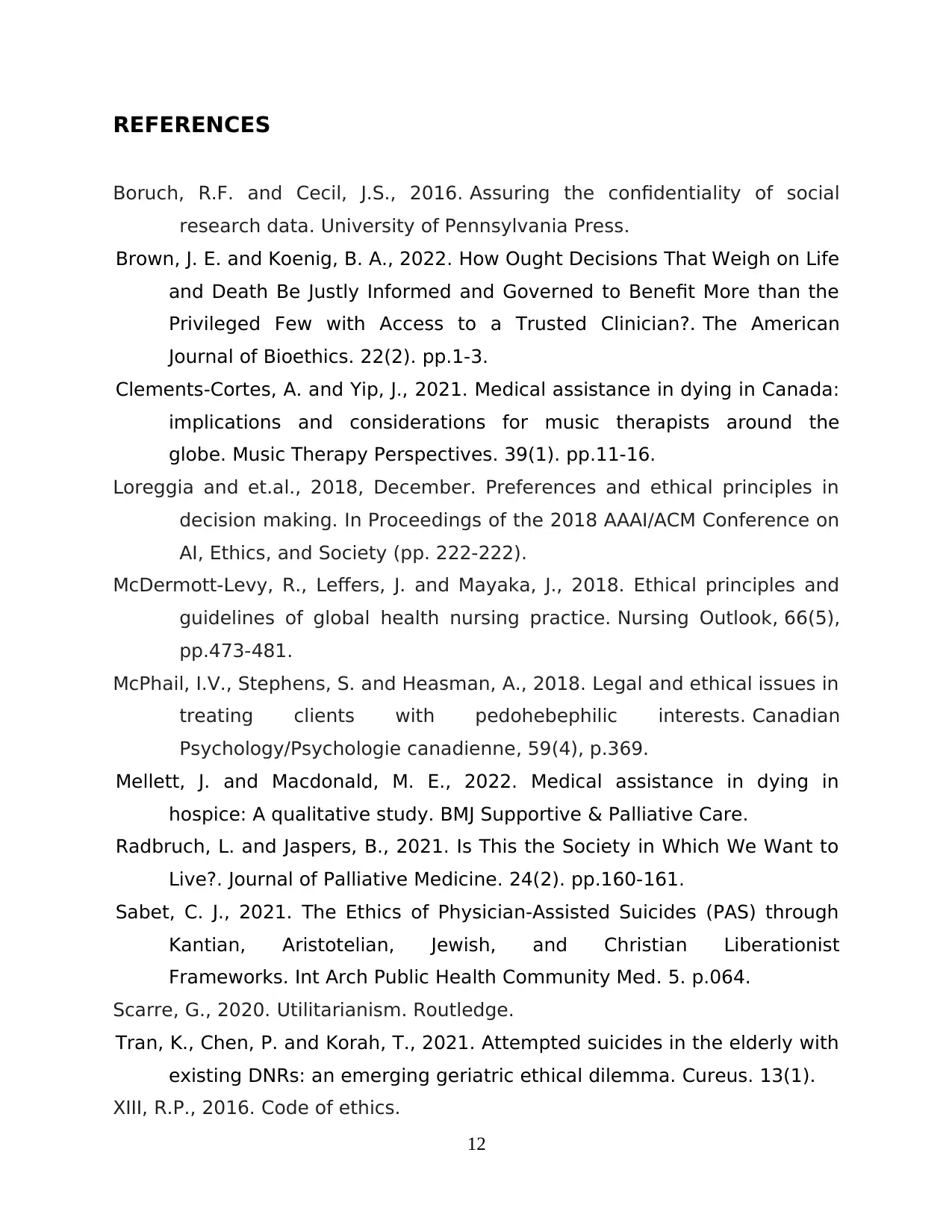
REFERENCES
Boruch, R.F. and Cecil, J.S., 2016. Assuring the confidentiality of social
research data. University of Pennsylvania Press.
Brown, J. E. and Koenig, B. A., 2022. How Ought Decisions That Weigh on Life
and Death Be Justly Informed and Governed to Benefit More than the
Privileged Few with Access to a Trusted Clinician?. The American
Journal of Bioethics. 22(2). pp.1-3.
Clements-Cortes, A. and Yip, J., 2021. Medical assistance in dying in Canada:
implications and considerations for music therapists around the
globe. Music Therapy Perspectives. 39(1). pp.11-16.
Loreggia and et.al., 2018, December. Preferences and ethical principles in
decision making. In Proceedings of the 2018 AAAI/ACM Conference on
AI, Ethics, and Society (pp. 222-222).
McDermott-Levy, R., Leffers, J. and Mayaka, J., 2018. Ethical principles and
guidelines of global health nursing practice. Nursing Outlook, 66(5),
pp.473-481.
McPhail, I.V., Stephens, S. and Heasman, A., 2018. Legal and ethical issues in
treating clients with pedohebephilic interests. Canadian
Psychology/Psychologie canadienne, 59(4), p.369.
Mellett, J. and Macdonald, M. E., 2022. Medical assistance in dying in
hospice: A qualitative study. BMJ Supportive & Palliative Care.
Radbruch, L. and Jaspers, B., 2021. Is This the Society in Which We Want to
Live?. Journal of Palliative Medicine. 24(2). pp.160-161.
Sabet, C. J., 2021. The Ethics of Physician-Assisted Suicides (PAS) through
Kantian, Aristotelian, Jewish, and Christian Liberationist
Frameworks. Int Arch Public Health Community Med. 5. p.064.
Scarre, G., 2020. Utilitarianism. Routledge.
Tran, K., Chen, P. and Korah, T., 2021. Attempted suicides in the elderly with
existing DNRs: an emerging geriatric ethical dilemma. Cureus. 13(1).
XIII, R.P., 2016. Code of ethics.
12
Boruch, R.F. and Cecil, J.S., 2016. Assuring the confidentiality of social
research data. University of Pennsylvania Press.
Brown, J. E. and Koenig, B. A., 2022. How Ought Decisions That Weigh on Life
and Death Be Justly Informed and Governed to Benefit More than the
Privileged Few with Access to a Trusted Clinician?. The American
Journal of Bioethics. 22(2). pp.1-3.
Clements-Cortes, A. and Yip, J., 2021. Medical assistance in dying in Canada:
implications and considerations for music therapists around the
globe. Music Therapy Perspectives. 39(1). pp.11-16.
Loreggia and et.al., 2018, December. Preferences and ethical principles in
decision making. In Proceedings of the 2018 AAAI/ACM Conference on
AI, Ethics, and Society (pp. 222-222).
McDermott-Levy, R., Leffers, J. and Mayaka, J., 2018. Ethical principles and
guidelines of global health nursing practice. Nursing Outlook, 66(5),
pp.473-481.
McPhail, I.V., Stephens, S. and Heasman, A., 2018. Legal and ethical issues in
treating clients with pedohebephilic interests. Canadian
Psychology/Psychologie canadienne, 59(4), p.369.
Mellett, J. and Macdonald, M. E., 2022. Medical assistance in dying in
hospice: A qualitative study. BMJ Supportive & Palliative Care.
Radbruch, L. and Jaspers, B., 2021. Is This the Society in Which We Want to
Live?. Journal of Palliative Medicine. 24(2). pp.160-161.
Sabet, C. J., 2021. The Ethics of Physician-Assisted Suicides (PAS) through
Kantian, Aristotelian, Jewish, and Christian Liberationist
Frameworks. Int Arch Public Health Community Med. 5. p.064.
Scarre, G., 2020. Utilitarianism. Routledge.
Tran, K., Chen, P. and Korah, T., 2021. Attempted suicides in the elderly with
existing DNRs: an emerging geriatric ethical dilemma. Cureus. 13(1).
XIII, R.P., 2016. Code of ethics.
12

13
1 out of 13
Related Documents
Your All-in-One AI-Powered Toolkit for Academic Success.
+13062052269
info@desklib.com
Available 24*7 on WhatsApp / Email
![[object Object]](/_next/static/media/star-bottom.7253800d.svg)
Unlock your academic potential
© 2024 | Zucol Services PVT LTD | All rights reserved.





